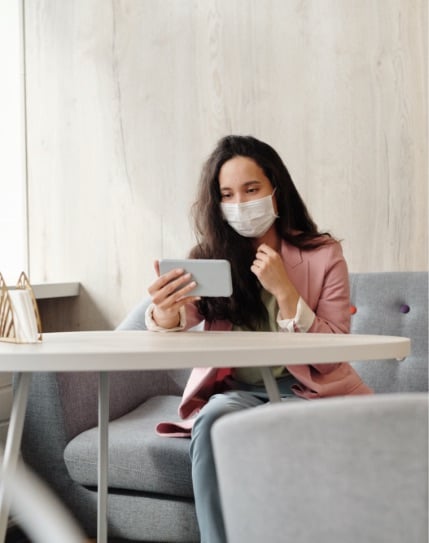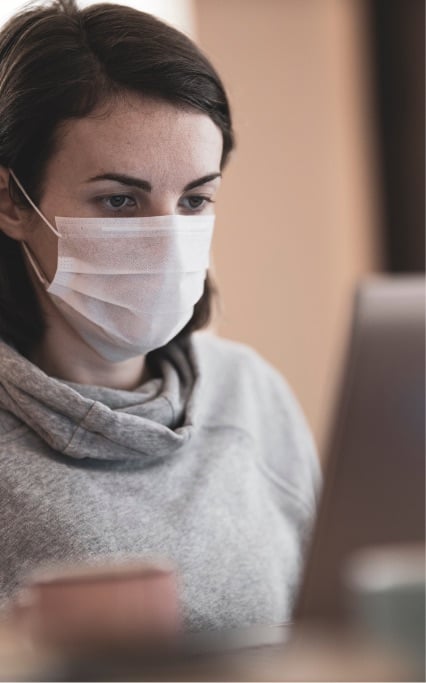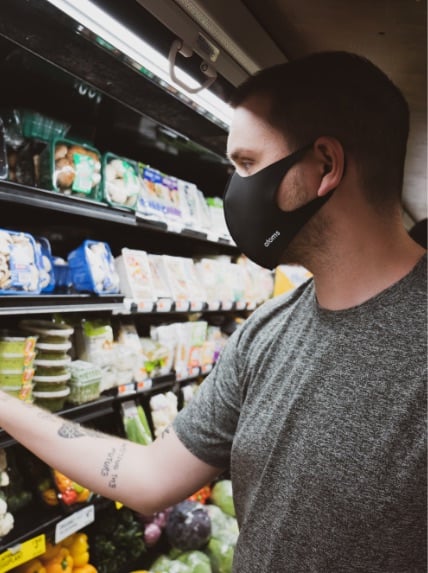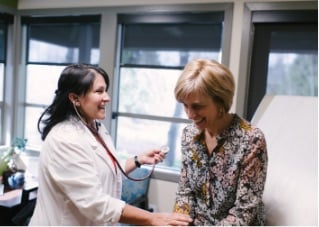What You Should Know
About Coronavirus
About Coronavirus
COVID-19 State Vaccine Information
Looking for vaccine information specific to your state?
Select your state from the drop-down list below to get started and find the information you need.
Related Webinars

Webinar
Navigating COVID-19: Vaccines, Variants, Vigilance
Have questions concerning COVID-19 and vaccine options? Listen to the Vera Whole Health webinar with Bruce Heller, MD as he informs about different vaccine options, virus variants and how to stay vigilant in the fight against COVID-19.
Click here to watch the webinar or download slides

Webinar
The Intersection of COVID-19 and Flu Season and What That Means for You
Click here to hear about the current state of COVID-19, additional risks with the oncoming flu season, and how to be prepared and keep safe. Vera Whole Health brought together world-renowned experts on infectious disease, vaccines, and testing for this special webinar.
For the accompanying slides to the webinar recording use this link.

Webinar
Acknowledging and Coping with Pandemic-Induced Stress
To listen to the Vera Whole Health webinar, “Acknowledging and coping with pandemic-induced stress,” please click here.
The webinar, hosted by Behavioral Health Clinician, Michele Bauer, and Whole Health Coach, Cheridan Bryant, discusses tools and strategies to maintain good mental health during the COVID-19 pandemic and beyond.
Use this link to access the slides from the webinar. Besides the information shared in the webinar, the slides contain answers to questions submitted by participants, that because of time restraints, were not answered during the webinar.

Webinar
How To Stay Healthy, Cope, and Even Thrive, During a Pandemic
Click here to listen to the Vera Whole Health COVID-19 Webinar, “How to stay healthy, cope, and even thrive, during a pandemic.”
Hear recent developments, and walk away with tools and practices that can help you, your family members and friends stay healthy, process and cope with this crisis.
To access the slides used during the Vera Whole Health COVID-19 Webinar, please use this link.
For even more tips and guidance on how to stay healthy and cope during this pandemic, visit our Whole Health At Home resource page.
Frequently Asked Questions
Jump to a section:
 COVID-19 Vaccine
COVID-19 Vaccine
How do we know if the vaccines are safe?
COVID-19 vaccines were tested in large clinical trials to make sure they meet safety standards. Tens of thousands of people were recruited to participate in these trials to see how vaccines offer protection to people of different ages, races, and ethnicities, as well as those with different medical conditions. To date, millions of people in the United States have received COVID-19 vaccines under the most intense safety monitoring in U.S. history.
How many doses of the vaccine are needed?
The two authorized and recommended vaccines to prevent COVID-19 in the United States require two doses to be effective. A third vaccine is authorized as a single-dose injection. Additionally, the CDC recommends people 65 and older, residents in long-term care settings, and people aged 50-64 with underlying medical conditions should receive a booster shot of the Pfizer after completing their Pfizer primary series. For those who have received the Moderna or Johnson & Johnson vaccine, information on booster shots is not yet available.
Does Vera offer COVID-19 vaccines?
Many, but not all, of our care centers currently have COVID-19 vaccines in stock.
Is there a fee for the vaccine?
The vaccine is free for members eligible for services at Vera.
What side effects should I expect with the vaccine?
Common side effects from the COVID-19 vaccine include pain, redness, and swelling at the site of the injection and fatigue, headache, muscle pain, chills, fever, and nausea throughout the rest of your body. These mild side effects are normal signs that your body is building protection against COVID-19. They typically go away in a few days. Some people have no side effects.
Do I need to wear a mask after getting fully vaccinated?
To limit the spread of the Delta variant, the CDC recommends wearing a mask indoors in public even if you are fully vaccinated. However, if you have a weakened immune system or are at higher risk for severe COVID-19 illness, it is additionally recommended that you maintain 6 feet from others outside your home, avoid crowds and poorly ventilated spaces, and wash your hands often.
Together, COVID-19 vaccinations and following CDC’s recommendations for how to protect yourself and others will offer the best protection from getting and spreading COVID-19.
If I already had COVID-19, do I still need to get vaccinated?
[Direct quote from CDC:] Yes. Research has not yet shown how long you are protected from getting COVID-19 again after you recover from COVID-19. Furthermore, evidence is emerging that people get better protection by being fully vaccinated compared with having had COVID-19. One study showed that unvaccinated people who already had COVID-19 are more than 2 times as likely than fully vaccinated people to get COVID-19 again.
If you were treated for COVID-19 with monoclonal antibodies or convalescent plasma, you should wait 90 days before getting a COVID-19 vaccine. Talk to your doctor if you are unsure what treatments you received or if you have more questions about getting a COVID-19 vaccine.
 Masks
Masks
What type of mask should I choose?
- Choose a mask with two or more layers of washable, breathable fabric
- Choose a mask with a nose wire
- Ensure your mask fits snugly over your nose, mouth, and chin
- If you choose to wear a gaiter, make sure it’s folded to provide two layers of protection
- Face shields are not recommended by the CDC at this time — their effectiveness is currently being evaluated
- Children under age 2 should not wear a mask
Should I wear a double mask?
For you, your employees and members, it is not unreasonable for someone to choose to wear two masks. But there are three important points to note:
- At least one of the masks should be a disposable surgical mask, worn on the inside, closest to the face. Surgical masks have proven to be more effective than cloth masks. The outer mask should be a double layer cloth mask.
- People who have trouble breathing should take caution before wearing two masks. Think twice before double-masking your children.
- Do NOT double mask with N95 masks. In fact, the director of the CDC, Dr. Rochelle Walensky, advises that the public refrain from wearing N95 masks altogether. When fitted properly, N95 masks are difficult to breathe through and uncomfortable when worn for long periods of time, and the fear is that these two factors may deter people from wearing masks at all.
 Testing and treating for COVID-19
Testing and treating for COVID-19
Which COVID-19 tests are available at Vera?
- Quest or LabCorp PCR nasal swab
- Abbott ID NOW rapid screening test (not available at our Downtown Portland, Midtown Anchorage, or Edinburg Care Centers and subject to availability at all other care centers)
- CRL saliva PCR test (not available at Edinburg Care Center)
What are the advantages of the saliva COVID-19 test?
Some of the advantages of the saliva COVID-19 test include:
- Results are available within 48 hours of taking the test
- Just as accurate as nasal PCR COVID-19 test if exhibiting symptoms
- Less invasive — just spit into a tube
- Test can be done at home
- It’s free for Vera members
Just be sure to avoid eating, drinking anything, or smoking for 30 min before you take the test.
Which COVID-19 tests are most accurate?
It depends, each of our tests has its strengths and weaknesses. As always, please check with your care center to see which tests are available.
- Quest or LabCorp PCR nasal swab
- Best for catching COVID-19 just before symptoms start and throughout the course of illness
- Unfortunately, this test requires a nasal swab and can take several days to get a result
- Abbott ID NOW rapid screening test
- Best for patients who just started having symptoms and need a fast result
- This test is not great for people who don’t have symptoms or who are well into their course of illness
- CRL saliva PCR test
- Same as the Quest or LabCorp but has a slightly faster turnaround time and doesn’t require a painful nose swab
I think I was exposed to COVID-19 or I have symptoms. What do I do?
Please call your Vera Care Center if you think you were exposed to COVID-19 or have fever or cough. You will be triaged to talk with a Vera provider. The Vera provider will determine whether to schedule an in-person visit with you.
Can I go to a lab or emergency room (ER) to get tested for COVID-19?
The ER is for medical emergencies only. If you are experiencing severe shortness of breath, lightheadedness, etc., call 911.
You can always contact your provider at your Vera Care Center. After discussing your symptoms, your provider may determine that you do not need to be tested for COVID-19. At this point, your doctor will help advise you on how to treat your symptoms from home, including taking medicine to reduce fever or other symptoms.
What happens if I feel sick but don’t need or want the test?
You can always contact your provider at your Vera Care Center. After discussing your symptoms, your provider may determine that you do not need to be tested for COVID-19. At this point, your doctor will help advise you on how to treat your symptoms from home, including taking medicine to reduce fever or other symptoms.
Can I refill my prescription early?
It may be possible. Please call the number on the back of your medical insurance card to learn if you can refill your prescription early. All insurance plans work differently.
What is a COVID-19 antibody test?
A COVID-19 antibody test looks for signs of the body’s defensive response (“antibodies”) to a COVID-19 infection. In general, antibodies can be found in the blood of people who are tested after an infection of any kind and show that they have had an immune response to the infection.
Important note: Immune response refers to the body’s immune system responding to an infection. It does not mean “immunity,” or safety from becoming infected again.
Can I get a COVID-19 antibody test at Vera?
Not currently, and there are two reasons why:
First, an antibody test isn’t useful as a diagnostic tool. The best known, FDA-approved antibody test for COVID-19 will only show results after someone has been infected for about 10-14 days. In other words, it takes almost two weeks after a person has been infected to generate enough antibodies for an antibody test to detect them.
Second, it is still unknown whether the antibodies that result from SARS-CoV-2 (the virus that causes COVID-19) provide immunity from a future COVID-19 infection beyond three months. CDC scientists are conducting studies to better understand the level of antibodies needed for protection, the duration of that protection, and the factors associated with whether a person develops a protective antibody response.
We will update these FAQs as more information is revealed.
 Appointments at a Vera Care Center
Appointments at a Vera Care Center
How have in-person visits changed as a result of COVID-19?
We’ve made a number of changes in our care centers to keep our members and staff safe and healthy. We’re committed to exceeding any guidance regarding health, safety, and infection controls provided by local and federal health authorities.
Here are the specific changes:
- Modified Hours: We’ve broken up each day into two halves. Members coming in for non-respiratory symptoms will be scheduled during morning hours. The afternoon is reserved for members with respiratory complaints or needing a COVID-19 screening.
- Pre-Visit Phone Screening: All patients will be screened for recent illness, travel, fever or recent exposure to COVID-19 via phone prior to their visit. This will allow us to schedule your appointment for the right time of the day.
- Waiting In Cars: Members are welcome to wait in their cars when they arrive at the care center. Just call the front desk to let us know you have arrived, and we’ll call back when we’re ready for you to come in.
- Family Members: To reduce exposure, please do not bring family members with you to in-person visits.
- Masks: We ask all members to wear a mask when they visit the care center. Vera will provide a surgical mask for any patients who do not have a mask.
- Waiting Room Changes: We’ve implemented enhanced cleaning practices, spaced out waiting room chairs and provided other signage to ensure social distancing. All books, magazines, and brochures have been removed. Plexiglass has been installed at the front desk to keep staff and patients safe.
What is a virtual appointment?
A virtual appointment allows you to meet with your provider over video from the comfort of your home, or anywhere else you choose to be.
Can I still come into the care center?
Yes, we're ready to see you in person. Call and make an appointment for a sick care or wellness visit.
You will be asked to complete a pre-visit phone screening prior to your in-person appointment. This will allow us to schedule your appointment for the right time of day. Members coming in for non-respiratory symptoms are scheduled during morning hours. The afternoon is reserved for members with respiratory complaints and COVID-19 tests.
How do I schedule an appointment?
You can schedule a sick care or wellness appointment by calling the Vera Care Center. You can find the phone number here.
Can I schedule a health coaching appointment?
Yes, you can make health coaching appointments any time. You will have the option of doing your health coach visit in-person or over the phone.
 Virtual Appointments
Virtual Appointments
What is a virtual appointment?
A virtual appointment allows you to meet with your provider over video from the comfort of your home, or anywhere else you choose to be.
Is a virtual appointment any different from a regular in-person appointment?
Except for the fact that you’re talking over video, no! If you’ve ever used FaceTime or Skype, this is exactly the same.
Can I schedule all my appointments to be virtual?
It depends. If you prefer virtual appointments, then by all means feel free to schedule them. But there might come a time when your provider needs to see you in person. If so, they’ll let you know.
Can a friend or family member be with me during my virtual appointment?
Of course. If you would feel more comfortable having a friend or family member with you, please feel free to include them.
What if I am having technical difficulties during my appointment?
If you experience any difficulties during your appointment, please either tell us (if you can during your appointment) or call us. You can also end your appointment at any time during the session by clicking the “end meeting” button at the bottom right corner of your screen.
Is there a cost to my virtual appointment?
No. But let us be clear. There is no extra cost to having a virtual appointment as opposed to an in-person appointment. But there may be a co-pay depending on the care you need. If it’s for respiratory issues, there’s no cost. If it’s something else, there might be a copay, but we’ll be sure to discuss that with you during your appointment.
How is my privacy protected?
Virtual appointments are scheduled using a unique visit ID. And in addition to the fact that your provider will be in a private room themselves, your appointment takes place in real time and is not recorded. Your appointment will be held over a HIPAA-compliant, secured network that meets all privacy and security standards.
What if I need a prescription? Can my provider give me one over a virtual appointment?
Yes. Your provider can write you a prescription or request additional testing (e.g. X-ray, lab tests) by sending it electronically to the pharmacy or lab of your choice.
What is a virtual wellness visit and how does it work with my annual whole health evaluation?
We’re happy to announce that we’re offering virtual provider wellness visits for patients.
A virtual provider wellness visit can serve as the first part of your Annual Whole Health Evaluation. During the virtual wellness visit you can share your health history and any current health concerns with your provider. Once you’ve completed this 60-minute visit with your provider you’ll be asked to do the following:
- Schedule a follow-up in person visit within 60 days: We’ll complete your biometric screening and a physical exam at this visit. It’s important to complete this follow-up visit within 60 days of the virtual wellness visit so the provider has all of your most current health information and does not need to repeat parts of the virtual visit Read our FAQ page to learn what an in-person visit will be like post COVID-19. There are many safety measures we have put in place to protect patients and staff.
- Complete your coaching connection: You’ll be able to meet with your whole health coach over the phone or in-person
If your employer provides an incentive for completing your annual whole health evaluation, this can be the first step towards earning it.
Call your care center to schedule your virtual provider wellness visit today.
 About COVID-19
About COVID-19
How does the virus spread?
It appears the virus spreads like other respiratory viruses – by people with the infection coughing and sneezing. These droplets and airborne particles are inhaled by other people or moved to the eyes, nose or mouth by contaminated hands.
What can I do to keep myself, my family and my friends safe?
Get vaccinated! Also wear a mask, stay at least six feet apart, avoid crowds, and wash your hands often. Lastly, avoid close contact with people who are sick, and stay home if you are feeling ill.
How do I stop the spread if I am sick with COVID-19?
To care for yourself, and protect others in your home or community if you have, or think you have COVID-19, follow these steps from the CDC:
- Stay home except to get medical care*
- Separate yourself from other people and pets in your home
- Monitor your symptoms
- Call ahead before visiting your doctor
- If you are sick wear a mask
- Cover your coughs and sneezes
- Clean your hands often
- Avoid sharing personal household items
- Clean all “high-touch” surfaces everyday
For more details on each of the steps listed above, click here
*If you think you have been exposed to COVID-19 or have a fever or cough, please call your Vera Care Center. You will be triaged to talk with a Vera provider. The Vera provider will determine whether or not to schedule an in-person visit with you.
How do I care for someone in my home who has COVID-19?
The CDC recommends the following steps when caring for someone in your home who has COVID-19:
- Provide support and help cover basic needs
- Watch for warning signs
- Difficulty breathing or shortness of breath
- Persistent pain or pressure in the chest
- New confusion or inability to wake up
- Bluish lips or face
- Protect yourself
- Limit contact
- Eat in separate rooms or areas
- Avoid sharing personal items
- Make sure the sick person wears a cloth face covering when you and others are around
- Wash your hands often
- Clean and disinfect high-touch surfaces and items every day
- Use lined trash cans
- Track your own health
For more information on these steps, go to caring for someone sick at home.
Where can I learn more about COVID-19?
For all that you need to know, including travel advisories: cdc.gov/coronavirus
For specific questions, see the CDC’s FAQ section.
For information about COVID-19 in your state, search your state’s health department, which works with the CDC to monitor and implement all recommendations.
 COVID-19 and Insurance
COVID-19 and Insurance
Is COVID-19 testing covered by insurance?*
Yes. The federal Families First Coronavirus Response Act, passed on March 18, 2020, requires health insurance companies to waive cost-sharing charges for FDA-approved COVID-19 testing. Cost-sharing includes copayments, co-insurance and deductibles.
This law also says that cost sharing should be waived for telehealth services, in-person doctor visits, and urgent care center and emergency room visits related to COVID-19 testing.
All other treatments and services including hospitalization are subject to the usual benefits and cost shares. Pre-authorization for medically necessary and FDA-authorized COVID-19 testing is not required. Any care needed once diagnosis of COVID-19 has occurred will be covered consistent with the standard provisions of your health benefits.
Get started with advanced primary care
Get in touch today to learn how you can work with Vera to operate at the top of your license and practice healthcare the way it was meant to be.

